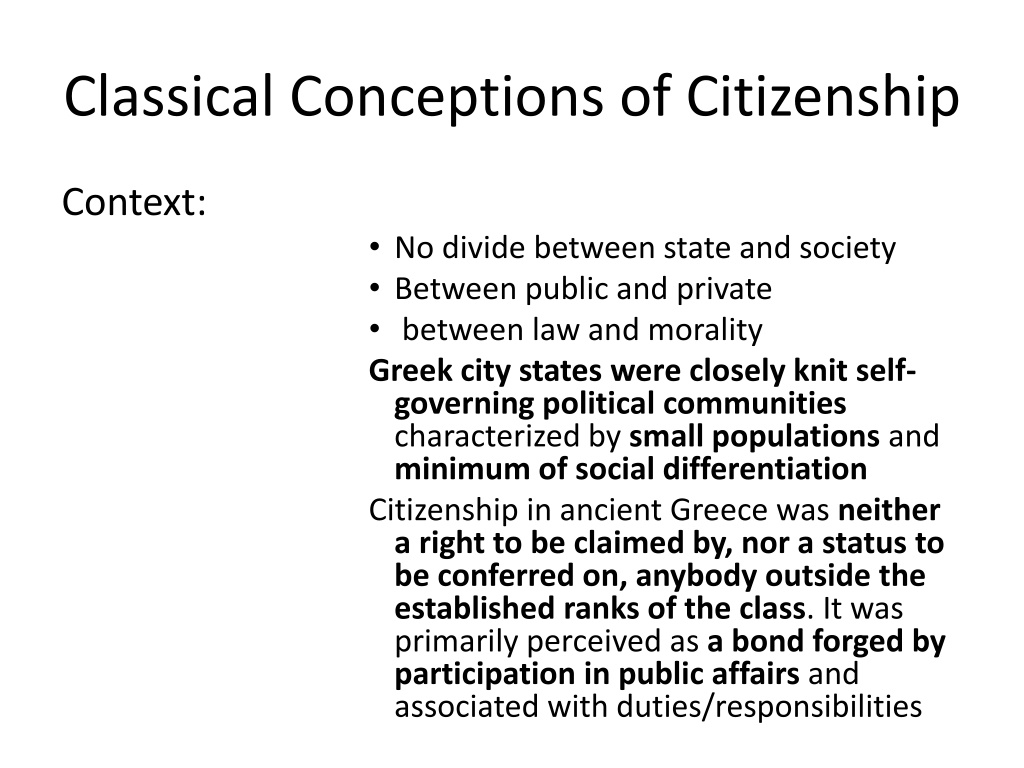Ancient Greek Citizenship and Aristotle's Views
In ancient Greece, citizenship was a bond forged through participation in public affairs, with emphasis on duties and responsibilities rather than rights. Aristotle's views on citizenship emphasized active political participation, civic virtue, and exclusivity. Citizens were those involved in the civic life of ruling and being ruled in turn. The status of citizenship was exclusive, with certain groups like slaves, women, and foreigners excluded. Aristotle believed that humans are inherently political animals, and the polis evolved from natural partnerships for the common good.
Download Presentation

Please find below an Image/Link to download the presentation.
The content on the website is provided AS IS for your information and personal use only. It may not be sold, licensed, or shared on other websites without obtaining consent from the author. Download presentation by click this link. If you encounter any issues during the download, it is possible that the publisher has removed the file from their server.
E N D
Presentation Transcript
Classical Conceptions of Citizenship Context: No divide between state and society Between public and private between law and morality Greek city states were closely knit self- governing political communities characterized by small populations and minimum of social differentiation Citizenship in ancient Greece was neither a right to be claimed by, nor a status to be conferred on, anybody outside the established ranks of the class. It was primarily perceived as a bond forged by participation in public affairs and associated with duties/responsibilities
Aristotles Views on Citizenship Citizen was one who enjoyed the right of sharing in deliberative and judicial office Who shared in the civic life of ruling and being ruled in turn Organization of the Republic: Based on the notions of familiarity and trust, Commitment to civic virtue and the common good, Principles of active political participation, The prioritization of public and political aspects of life over private interests, and the primacy of man as citizen
Aristotles Views on Citizenship (contd) Status of citizenship was highly exclusive: Inequality of status was accepted without question It was valued in part because of its exclusive nature and because it stood as a mark of superiority over non-citizens, a privileged status. So hierarchy and exclusion-
Aristotles Views of Citizenship (Contd.) List of Exclusion: Slaves were excluded from citizenship as they lacked the deliberative faculty Women were excluded for lacking the necessary rationality required for political participation Metis (People of foreign origin)
Aristotles Teleological Explanation Man is by nature a political animal (Zoon Politikon). At the core of this statement there is an account of the origins of political community or the polis- how it comes into being for natural reasons and exists for the sake of the good life, which is the end of the political community. Nature, for Aristotle, reflects the very process of evolution- Polis-grown out of natural partnerships such as the household and village.
Aristotles Teleological Explanation(Contd.) Polis is natural because it fulfils the end to which human life tends-self sufficiency All partnerships are natural in that they serve the ends of self-sufficiency. The polis or the city-state while coming into being for the sake of living ----exists for the sake of living well As a form of political partnership, polis is higher than other forms of partnership for it enables and directs us towards the good life The aim of the good life of the polis is a natural end, its telos Being the highest form of partnership the polis is prior by nature to the household and to each of us
Aristotles Teleological Explanation(Contd.) Thus the whole must of necessity be prior to the part Citizenship must, therefore, be geared towards the goals of the polis Aristotle for a regime-differentiated understanding of citizenship-regime-specific citizenship where the nature of citizenship varies from regime to regime.

